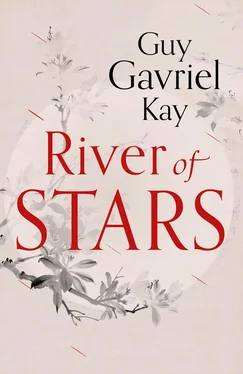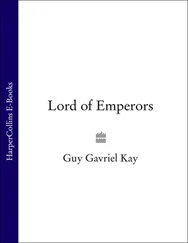Lu Chen says, “I am not so vain, or unmannerly, to have imagined anything beyond talking here tonight.”
She draws a breath, and with it (with his words) her fear seems to have gone, as quickly as it had flowered within. She can even smile, carefully, looking down.
“Not even imagined?” she asks.
Hears him laugh, her reward. “I deserve that,” the poet says. “But, Miss Lin …” His tone has changed, she looks up. “We may imagine much, but not always allow these visions to enter the world. We all live this way.”
“Must we?” she asks.
“I think so. The world falls apart, otherwise. There are men I have imagined killing, for example.”
She can guess who one or two of those might be. She draws a breath, finding courage. “I think … I think you meant to honour me, coming here. Sharing these thoughts. I know how wide the space is between us, because of my sex, my age, my inexperience. I want only to tell you that I am not … that you need not …”
She is short of breath. Shakes her head impatiently. Pushes forwards. Says, “You need not assume I would be offended if you came into the room now, Master Chen.”
There. Said. And the world has not broken asunder. No other animal has screamed outside. Burning suns are not falling, shot down by arrows of legend.
And she will not, she will not live defined or controlled by what others think or say. Because this is the life, the path, hard and lonely, her father has put her on—never realizing it would be so, never intending this when he began to teach her and they discovered, together, that she was quicker and brighter and perhaps even deeper than almost any man they knew.
But not more so than this one. He is looking at her with a different expression now. But has not stepped forward, and whatever she is, however bold she might force herself to be, she cannot cross to him. It is beyond her.
He says, unexpectedly, “You might make me weep, Miss Lin. Thinking of your life.”
She blinks at that. “Not what I want to do.”
“I know that.” A faint smile. “The world is not going to allow you to be what you might be. You understand?”
She lifts her head. “It hasn’t allowed you to be. Why should it let—”
“Not the same. You know it.”
She does. Lowers her head.
“Nor need you challenge it with every breath, every encounter. You will break yourself, as if on rocks.”
“You did. You challenged. You’ve never held back from saying when you thought ministers or even the emperor were—”
“Again, not the same. I have been allowed to find my view of the world, and give voice to it. There are risks to doing so, changing times make for changing fortunes, but it is still not the same as what lies ahead of you.”
She feels chastened, and yet oddly reassured, sustained. He sees her. She makes herself meet his gaze. “Is this how you always respond when a woman offers you—”
A third time he stops her, a lifted hand this time. Not smiling. She is silent, waits.
He gives her (she will always remember it that way) a gift. “No woman, or man, has ever offered quite what you just have. I would destroy the gift by accepting it. It is necessary, for both of us, that I leave you now. Please believe I am honoured beyond words or deserving, and that I will be equally honoured to read your writing when you choose to send it to me.”
Shan swallows hard. Hears him say, “You are now another reason why I intend to survive Lingzhou and return. I would like to watch you live your life.”
“I don’t …” She is finding it difficult to speak. “I don’t think I will be so much worth watching.”
His smile, celebrated, harnessed to the intransigence of courage. “I think you will,” says Lu Chen.
He bows to her. Does it twice. Walks from the room.
Closes the door quietly behind him.
She stands where she has been standing. She is aware of her breathing, the beating of her heart, is conscious of her body in a new way. She sees the lamp, the books, flowers, the bed.
One difficult breath. Her mouth a thin line of determination. She will not live the life others choose for her.
She crosses the room, opens the door.
The hallway is dark but the light from her room spills into it. He turns at the sound, a figure in the corridor, halfway along. She steps into the hallway. She looks at his dark shape in the shadows the world offers her (offers all of them). But there is light. Behind her in the room, and sometimes there may even be light ahead. He has stopped. She can see he has turned to look at her. There will be light for him to see her, where she stands.
“ Please? ” she says.
And extends a hand, holding it out towards the shape of a good man, in the darkness of a house that is not hers, and a world that is.
Military Officer Zhao Ziji, attached to a garrison in Hsiang Prefecture in the central rice lands south of the Great River, was sweating in hidden leather armour as his party walked through midsummer heat.
He wore a wide-brimmed merchant’s hat and a rope-belted hemp tunic over loose trousers as a disguise. His throat was dry as a desert bone, and he was ferociously angry with the lazy incompetents he was shepherding north like so many lambs through dangerous country towards the river. He was unable, in fact, to think of many occasions when he had been less happy.
Perhaps as a boy, when his sisters had seen him urinating once and had begun making jokes about the size of his private parts. He had beaten them both for it, which was his right, but that never stopped mockery once it started, did it?
You had to go off when you were old enough and do something reckless: join the army in a district far from home, to get entirely away from such laughter and the nicknames based on it. Even then you could lie in your cot in a barracks and imagine someone from home arriving in the morning, joining your company, and greeting you with a cheerful “Hai, Ziji Shortcock!” thereby afflicting your life here, too.
It wasn’t even true , for one thing. Not one singing girl had ever commented! Nor had any soldier, pissing beside him in a field or a latrine, raised an eyebrow, in any of the companies he’d served with or led. It had been utterly unfair for the girls to say such things about an eleven-year-old.
One of his sisters was dead, he’d wish or think no ill of her, for fear of rousing a ghost. The other was married to a man Ziji understood to be harsh with her when he drank, and had a mother-in-law with a sour disposition. He ought to feel sympathy. He didn’t. You said certain things, damaged someone’s life, and your own fate might take a different course because of it. Ziji believed that.
He also believed—indeed, he knew with certainty—that the hilly country through which they were now passing, carrying their prefect’s birthday gift for Deputy Prime Minister Kai Zhen, and three nightingales in cages for the emperor’s garden, was a place that just about bred outlaws.
The cages had been difficult to hide. They were in sacks, tied on the donkeys. He hoped the nightingales wouldn’t die. It would be bad for him if they did.
He never stopped looking around as they went. He kept imagining bandits springing up, armed and wild, from the brown grass by the path, from behind hummocks, surging from copses of trees or the darker woods they passed.
He had twelve men, seven of them soldiers. They had disguised themselves and the treasure they carried. They were on foot, carrying travellers’ packs, only six donkeys for the whole party’s gear. They looked like lesser merchants who had banded together heading for the river, not affluent enough to be riding, not obviously worth robbing—but enough of them to dissuade bandits from doing something foolish. Outlaws liked easy targets, not real fighting.
Читать дальше












